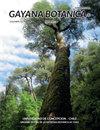Physiological responses of Pea plants to treatment with synthetic auxins and auxin-type herbicide
IF 0.5
4区 生物学
Q4 PLANT SCIENCES
引用次数: 2
Abstract
The effect of exogenously applied 2,4-D (2,4-dichlorophenoxyacetic acid) on growth and antioxidant defence of pea plants, preliminary treated with two synthetic auxin compounds 1-[2-chloroethoxycarbonyl-methyl]-4-naphthalenesulfonic acid calcium salt (TA-12) and 1-[2-dimethylaminoethoxycarbonylmethyl]naphthalene chlormethylate (TA-14) was examined. All chemicals were applied by foliar spraying. Applied alone, TA-12 and TA-14 had no significant effects, but they modulated the 2,4-D induced changes on most investigated biochemical parameters. The shoot fresh weight reduction caused by 2,4-D was partially overcome by the use of TAs. The use of TAs partially overcame the shoot fresh weight reduction induced by 2,4-D. Apart from this, no significant changes were observed in the other biometric parameters. Treatment with 2,4-D did not enhance lipid peroxidation, and hydrogen peroxide content was slightly increased. These data indicate that treatment with 2,4-D did not cause severe oxidative stress, which is also confirmed by the results of the antioxidant defence system. The application of 2,4-D provoked mild accumulation of thiol-containing compounds, free proline and phenolic compounds and increased the antioxidant enzyme activities (GST, SOD, CAT, POD and GR) to a moderate degree. Pretreatment with TAs noticeably decreased the non-enzymatic antioxidants (free proline, total phenolics and total low-molecular thiols) compared to plants treated with 2,4-D only. Except for GR, TAs pretreatment returned the enzyme activities to levels close to the controls. Based on the results obtained, we suggest that the application of both synthetic auxins could modulate 2,4-D herbicide effects.豌豆植物对合成生长素和生长素型除草剂处理的生理反应
研究了外源施用2,4-d(2,4-二氯苯氧乙酸)对豌豆生长和抗氧化防御的影响,初步研究了两种合成生长素化合物1-[2-氯乙氧羰基甲基]-4-萘磺酸钙盐(TA-12)和1-[2-二甲氨基乙氧羰基甲基]萘氯甲基(TA-14)。所有的化学药品都是叶面喷施。单独施用TA-12和TA-14时,TA-12和TA-14对2,4- d诱导的大部分生化参数的变化均有调节作用。2,4- d引起的嫩枝鲜重减少部分被TAs的使用所克服。TAs的使用部分克服了2,4- d引起的茎鲜重减少。除此之外,其他生物特征参数未见明显变化。2,4- d处理没有增强脂质过氧化作用,过氧化氢含量略有增加。这些数据表明,2,4- d处理不会引起严重的氧化应激,这也被抗氧化防御系统的结果所证实。2,4- d的施用引起了含硫醇类化合物、游离脯氨酸和酚类化合物的轻度积累,并适度提高了抗氧化酶(GST、SOD、CAT、POD和GR)活性。与仅用2,4- d处理的植物相比,经TAs预处理的植物的非酶抗氧化剂(游离脯氨酸、总酚类物质和总低分子硫醇)显著降低。除GR外,TAs预处理使酶活性恢复到接近对照组的水平。基于以上结果,我们认为这两种合成生长素的使用都可以调节2,4- d除草剂的效果。
本文章由计算机程序翻译,如有差异,请以英文原文为准。
求助全文
约1分钟内获得全文
求助全文
来源期刊

GAYANA BOTANICA
Agricultural and Biological Sciences-Plant Science
CiteScore
0.70
自引率
0.00%
发文量
8
审稿时长
6-12 weeks
期刊介绍:
The journal welcomes works carried out by scientists of all nationalities, and may be written in either English or Spanish. The journal receives works in systematic, taxonomy, floristic, ecology, physiology, morphology, development, conservation, cytology and phytochemical botany.
 求助内容:
求助内容: 应助结果提醒方式:
应助结果提醒方式:


